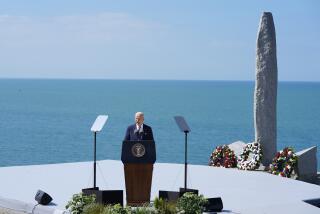Bush Speech Was Crafted to Silence Critics : Politics: President moved to seize high ground in debate spurred by Democrats.
ST. SIMONS ISLAND, Ga. — With a hastily arranged 20-minute television speech, President Bush has responded to what Republicans saw as mounting pressure to offer a tangible response to the stunning changes transforming the Soviet Union after 40 years of superpower animosity.
In so doing, the President on Friday moved to seize the high ground in the growing debate--likely to be amplified during the coming presidential campaign--over spending priorities and whether the United States can shift more resources from military spending to domestic programs.
Among Bush’s political advisers in the White House, and the pollsters and others around the country who make up the core of his outside advisers, there has been a growing recognition that the hammering Bush has taken from leading Democrats over his unyielding stance might eventually begin to chip away at his consistently high popularity ratings.
In a Wall Street Journal/NBC News poll made public Friday, Bush’s overall approval rating dropped from 70% a month ago to 64%. By a 51%-to-41% margin, voters disapproved of his performance in the economic realm. Support for deep cuts in U.S. defense spending--a step against which Bush argued in his speech--climbed from 37% in March to 42% in the new survey.
Such findings reflect criticisms that the fledgling campaigns for the Democratic presidential nomination are beginning to dish out. But the criticisms were being heard in Congress and in Europe, too.
Democrats, who are the majority in the House and Senate, as well as some U.S. allies in Europe, had complained that it was time to respond in a meaningful way to the crumbling of what is becoming known as the former Soviet Union.
The widespread consensus, recognized by Bush in his speech announcing weapons cuts, is that a Soviet strike at Western Europe now is extremely unlikely and that it is time for dramatic shifts in the United States’ nuclear posture.
“This was getting ahead of the curve,” a senior White House official said. “You could see the pressure building in Congress and Europe.”
For his part, Bush had nothing to say in public about the issue Saturday, when he flew to Brunswick, Ga., to spend a two-day golfing holiday at nearby Sea Island as a guest of former Atty. Gen. Griffin B. Bell. On Monday, he will embark on a mostly political swing through Florida and Louisiana.
By the account of one Administration official, the President instructed Brent Scowcroft, his national security adviser, just days after the failure of the right-wing coup attempt in the Soviet Union last month, to begin studying possible cuts in tactical, or short-range, nuclear weapons. These missiles and artillery shells have such limited ranges that their use in any war in Europe would likely damage territory now governed by Washington’s allies.
But as such studies and planning went on behind closed doors, the drumbeat of public criticism continued. As one Democrat after another announced plans to seek the nomination to challenge Bush’s anticipated reelection bid, each made it clear that one element of his campaign would be to press the White House on its limited response to the strikingly altered picture in Moscow and in the Soviet republics.
Gov. Douglas Wilder of Virginia, for example, is building a campaign around the theme “put America first.” Sen. Tom Harkin of Iowa said in declaring his candidacy that American resources should be used now to solve problems in this country.
“We’re not going to get to that new America if we have a President in the White House like George Bush, who thinks that the real threats to our national security are halfway around the world, when they’re really halfway down our streets,” Harkin said.
The President and his advisers, said John Buckley, a Republican political consultant, “are and have been under some pressure” to respond to such thrusts before they reach home.
“It is a smart strategic move at this time,” he argued, portraying Bush as having acted before public opinion had “congealed” around the Democrats’ criticisms. “It would seem to take some wind out of the Democrats’ sails because only a President can make these proposals in such a dramatic fashion.”
As a result of the measures that Bush announced Friday night in his address from the Oval Office, Buckley said, only a Democrat who is willing to be “off on the fringe” can say the President is not responding to the reduction of global threats.
Indeed, said another Republican consultant, Eddie Mahe, “The Democrats will have to agree with him” or else they will risk looking as though they are advocating “more radical and extreme” measures. Bush, he said, has seized “the high ground,” leaving the Democrats the choice of supporting him or appearing to be “nit-picking.”
The initial response from Democrats after the speech suggested they felt they had little room in which to maneuver. Sen. George J. Mitchell (D-Maine), the Senate majority leader, praised the President’s announcement. But, pointing to similar steps proposed in recent months by his Democratic colleagues, he struck an I-told-you-so note.
More to Read
Get the L.A. Times Politics newsletter
Deeply reported insights into legislation, politics and policy from Sacramento, Washington and beyond. In your inbox three times per week.
You may occasionally receive promotional content from the Los Angeles Times.










